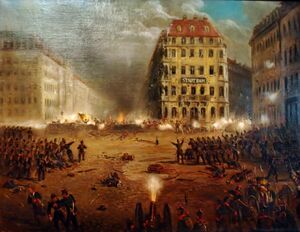Many thanks to our Patrons who cover ~2/3 of our hosting bill. Please join them if you can.
1849
Jump to navigation
Jump to search
1839 < 1840 < 1841 < 1842 < 1843 < 1844 < 1845 <1846 < 1847 < 1848 < 1849 > 1850 > 1851 > 1852 > 1853 > 1854 > 1855 > 1856 > 1857 > 1858 > 1859
 The May Uprising in Dresden is suppressed by Saxon and Prussian troops. | |
| The year 1849 is a year of reaction, as many of the liberal revolutions of the year before are crushed with military force. |
Contents
Events
- February 1 – The abolition of the Corn Laws by the United Kingdom's Importation Act 1846 comes fully into effect.
- February 8 – The new Roman Republic is proclaimed.
- March – The Frankfurt Parliament completes its drafting of a liberal constitution, and elects Frederick William IV emperor of the new German national state.
- March 3 - The United States Department of the Interior is established, incorporating the Census Office, General Land Office, Office of Indian Affairs and Patent and Trademark Office.
- March 5 - President Zachary Taylor is sworn in.
- March 30 – The Second Anglo-Sikh War ends, with the United Kingdom annexing the Punjab.
- April 1 - After 10 days, the insurrection in Brescia, (Italy) is ended by Austrian troops.
- April 2 – The German revolutions of 1848–49 end in failure, as King Frederick William IV of Prussia refuses to accept the offer of the Frankfurt National Assembly, to be crowned as German emperor.
- April 21 - Great Famine (Ireland): 96 inmates of the overcrowded Ballinrobe Union Workhouse died over the course of the preceding week from illness and other famine-related conditions, a record high.
- April 21 - The Austrian government asks Russian help against the Hungarian Revolution. Tsar Nicholas I of Russia agrees to send troops against Hungary.
- May 2 – Hungarian Revolution of 1848: A new independent Hungarian government, led by Bertalan Szemere, is formed. The head of state of Hungary becomes Lajos Kossuth, as governor president.
- May 3 - The May Uprising in Dresden, last of the German revolutions of 1848–49, begins. Richard Wagner is among the participants.
- May 9 – The May Uprising in Dresden is suppressed by the Kingdom of Saxony.
- May 15 – Troops of the Kingdom of the Two Sicilies take Palermo, and crush the republican government of Sicily.
- June 5 - Denmark becomes a constitutional monarchy.
- June 5 - Hungarian Revolution of 1848: The first Russian troops, led by Lieutenant General Fyodor Sergeyevich Panyutin, who come in the aid of the Habsburgs, cross the Hungarian border at Pozsony, in order to crush the Hungarian revolution.
- June 17 – Hungarian Revolution of 1848: The main Russian forces, led by Ivan Paskevich, cross the Hungarian border, and together with the Austrian troops, led by Julius Jacob von Haynau, start the final attack against the Hungarian Revolution. Now the Hungarian revolutionary troops, numbering 173,000 soldiers, which even before the Russian attack were in inferiority regarding their numbers, and the quality of their weapons and war industry, face a force of 370,000 Austro-Russian forces, and other tens of thousands of Croatian, Serbian and Romanian insurgents, who serve the Habsburg imperial interests.
- July 3 – French troops occupy Rome; the Roman Republic surrenders.
- August 2 – Hungarian Revolution of 1848: The Russian main forces, under Ivan Paskevich, defeat the Hungarian army under József Nagysándor, at Debrecen.
- August 11 – Hungarian Revolution of 1848: Lajos Kossuth and the Hungarian Government of Bertalan Szemere resign, and give all powers to the hands of Arthur Görgey. After this Kossuth, the ministries and many military officers leave Hungary, and ask asylum in Turkey.
- September 17 – African-American abolitionist Harriet Tubman escapes from slavery.
- October 4 – Hungarian Revolution of 1848: Komárom, the last bastion of the Hungarian Revolution, surrenders to the Austrian forces.
- October 6 - Hungarian Revolution of 1848: Lajos Batthyány, the first Hungarian prime minister, is executed by Austria in Pest.
- November 16 – A Russian court sentences Fyodor Dostoyevsky to death, for anti-government activities linked to a radical intellectual group, the Petrashevsky Circle. Facing a firing squad on December 23, the group members are reprieved at the last moment, and exiled to the katorga prison camps in Siberia.
Events
| Event | Start | End |
|---|---|---|
| Pax Brittanica | 1815 | 1915 |
| Victorian era | 1840 | 1901 |
New Groups
| Group | Image | Type | Description |
|---|---|---|---|
| Diocesan College |  | Interesting for Rhodes Scholarship / Milner group networks; embraced apartheid military role | |
| Helsinki University of Technology |  | University | Finnish research university |
| Pfizer |  | A multinational big pharma company. Made a killing during COVID |
==A Quotation==
Births
| Title | Born | Place of birth | Died | Summary | Description |
|---|---|---|---|---|---|
| William Stead | 5 July 1849 | Northumberland UK Embleton | 15 April 1912 | Deep politician | Suspected UK deep politician who died aboard the Titanic |
| Basil Zaharoff | 6 October 1849 | Turkey Muğla | 27 November 1936 | Arms Dealer | The first modern arms dealer, cunning, aggressive and ruthless. |
Many thanks to our Patrons who cover ~2/3 of our hosting bill. Please join them if you can.